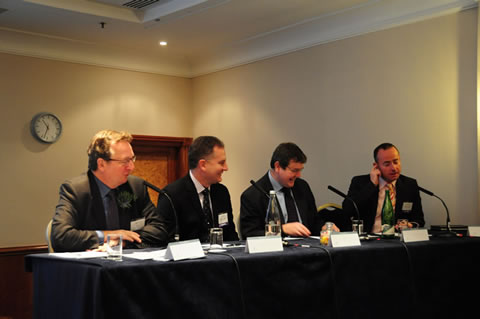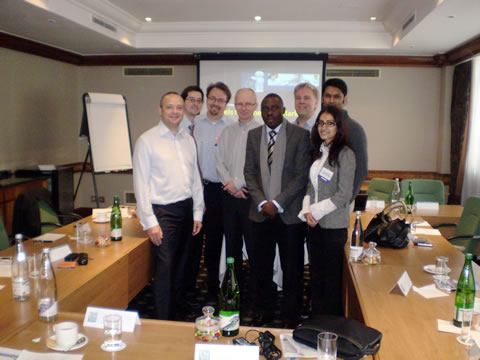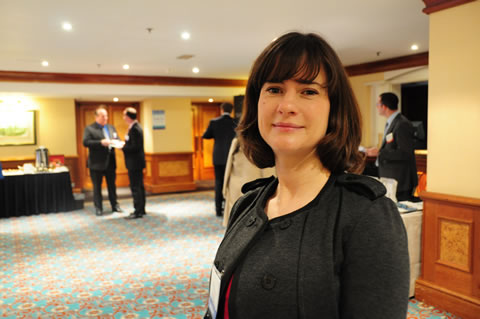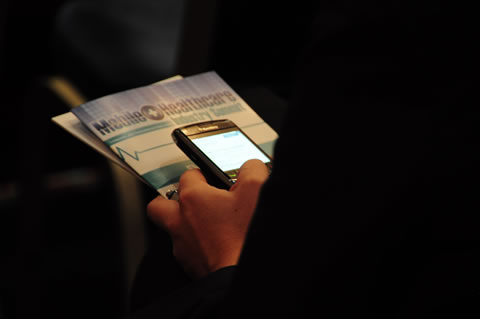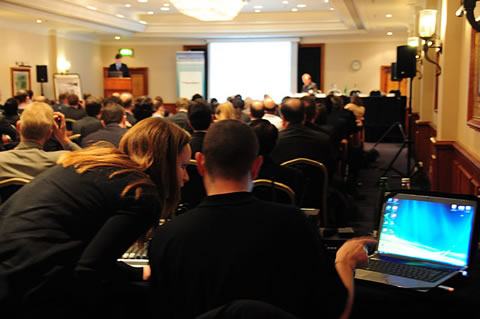The IT crowd: making mobile healthcare simpler and more cost-effective
This article was originally published in Clinica
The healthcare IT system doesn’t have to be expensive or complicated, as long as integrators know how it is appropriated. Salina Christmas met the IT hardware and software companies at the Informa Telecoms & Media’s Mobile Health Industry Summit to discuss how wireless e-health can help with patient compliance – and cost-cutting
UK chancellor Alistair Darling this week revealed that some £600m will be cut from the budget that was to go towards running the National Health Service's IT system. "The NHS had a quite expensive IT system that, frankly, isn't essential to the frontline, ” said Mr Darling in a television interview.
But if the IT system was that costly to run, one can imagine the myriad IT applications running on the NHS platform that are not all appropriated to specific local needs, and the kind of complex IT protocols being employed to do the easiest of tasks.
Clinica at The Mobile Healthcare Summit 2009 Special features from the summit held from December 1-2. Salina Christmas reports from London, UK | |
 | Reportage |
 | Clinica in a Click |
 | Vodafone moves into telehealth with dedicated healthcare unit |
It’s a problem of scalability. At last week’s inaugural Mobile Health Industry Summit in London, UK, where healthcare providers, telecoms carriers and handset vendors discussed the practicality of mobile telecommunications in facilitating remote healthcare and patient compliance, the consensus among the speakers was that “technology doesn’t have to be overcomplicated” – as long as the integrators know how it is to be appropriated.
The summit, held on December 1-2, featured over 60 leading innovator speakers from the wireless and healthcare sectors, with over 10 CEO keynote presentations from global wireless and healthcare companies.
Do away with technological determinism
In his speech on consumer-driven models for mobile healthcare during the keynote plenary session, George Macginnis, leader of the Assistive Technology Programme at NHS Connecting for Health, underlined that the success of a mobile heath system lies in how ‘the technology is integrated’.
| |
| From left: Dr Mike Short of O2, Chuck Parker of Continua Health Alliance, George Macginnis of Assistive Technology Programme, NHS Connecting for Health, and Neil Jordan of Microsoft World Wide Health |
Neil Jordan, Microsoft’s managing director for worldwide health, who took to the podium afterwards, put it simply like this: “It’s about people, not technology.”
“In US, it still astounds me how expensive it is to put information on an IT platform,” he said. “They use desperately overcomplicated tools to do simple tasks.” To him, innovation is easy, but making a technology system as flexible as possible is hard.
During a workshop, where mobile healthcare start-ups explained their innovations, Smart Health’s CEO Tuvi Orbach recounted how he started off with a very sophisticated intelligent healthcare concept, only to have it scaled down to suit the patient’s level of digital "literacy".
At the same workshop, Ken Dicks, CEO of MedApps, emphasised that his mobile technology is about “20% technology, 80% psychology”. According to him, the 5% of chronically ill patients that spend some 50% out of total healthcare costs in the US are often elderly patients who have apprehensions about “smartphones”. Many of these heavy spenders don’t have access or don’t see the need to have broadband or internet at home. Accessibility to these platforms must be addressed first.
“If you have the device where the diagnosis can be performed, you have a better chance of adoption,” he said.
It's not your data, it's everybody's
Appropriation is not the only key issue in how well an healthcare IT application is adopted. Dr Muhammad Al-Ubaydli, CEO of Patients Knows Best, observed that “doctors are still nervous about their patients writing their own data. Clinicians still think it is their data, not the patient’s.”
Mindsets certainly have to be adjusted to adapt to an age where economy, interoperability and faster data exchange means that mobile health platforms will have to run on both proprietary and open source platforms.
To paraphrase Mr Macginnis, the wishes of the patients must be respected. The best thing is to take advantage of a unique digital model that places the end users as a potential generator of data.
| |
| Participants of the Stream Two workshop |
There are still legal and technical hurdles to be considered, in particular with regards to privacy of patient data, patents and copyrights. However, where patents and copyrights are concerned, the corporations involved seem to accept the practicality of having to work with the open source camp.
Where mobile health systems are concerned, Microsoft does not seem to mind having to mix its proprietary technology with open source application programming interfaces (APIs). It has a special interest in healthcare as a vertical industry, Mr Jordan said, largely because of Bill and Melinda Gates’ corporate social responsibility efforts in developing regions across the world.
“We’re not interested in maintaining standards,” he said. “We can't do it on our own. It is fine to use open source APIs. There is a business model, which is more flexible than the models we see in the past.”
When the power grids are bad, go mobile
Practicality to Dr Adesina Iluyemi, CEO. of SinseProd, means something different altogether. To him, the mobile phone platform makes more sense than power grids, which are either absent or not working as well they should in most part of Africa.
“The problem faced by developing countries in the region is that the technology is driven by non-governmental organisations who live in silos,” he explained. “A huge percentage of medical technology is useless in Africa. That's how we develop mobile as the basis of healthcare. We always have a legacy system.” The GPRS system, he said, is already in place in Africa.
| |
| Dr Dianne Sullivan, scientific advisor at Vodafone, is in charge of spearheading the pilot projects and testing proofs-of-concept for end user-driven applications in mobile healthcare |
The African case is unique, of course. High rural population, coupled with ‘high disease border’ (malaria is more endemic in the continent compared with HIV) means that there is a need for remote diagnosis. The standard medical devices can pose a few problems, said Dr Iluyemi. They can be “absent, expensive, not personalised” and “a poor fit” compared with mobile health innovations which can come as "plug-and-play" appendages.
We're not undercutting the medtech industry
Another strong message at the summit was that the mobile device guys are not here to undercut the traditional medical device guys.
At the workshop, Dr Al-Ubaydli of Patients Know Best took time to explain that mobile disease management is to be used after a crucial diagnosis is done with, for example, a thorough MRI scanning or IVD test. Tests on conditions such as HIV, or cancer that have to be accurate and also be accompanied by counselling should only be done by the experts using the proper equipment at hospitals.
Mobile healthcare functions as an aid for remote self medication or patient compliance. It is also there to help cut admissions to hospitals, and thus, driving down costs of care at the hospital. “Computer is the bridge,” Al-Ubaydli said. “We’re not here to create digital divide.”
| |
| Blackberry is the Silver Sponsor of the Mobile Health Industry Summit 2009 |
The final say is with the carriers
What is crucial to the success of mobile healthcare, apart from the right level of technological appropriation, is the carrier’s cooperation, a point emphasised by both Neil Jordan and Ken Dicks.
“There is no holy grail solution, there is no one size fits all,” Ken Dicks told his audience. “You have to find the right combination of applications.”
However, “the persons that are gonna make it work are the carriers,” he stated, referring to the fact that it is traditionally the telecommunication providers who dictate the types of applications or specifications that would go on a handset they carry.
Show me the money
Also key to the success of the mobile initiative is investment. Neil Jordan, who’d like to see more investors at the summit, said that when it comes to money, the problem again is one of “scale”. But this is not impossible to address.
He envisaged the day when "the open source toolkit would be sitting over proprietary software". Why not work on a remote healthcare system built on $80 device? “Insurers realise that they spent too much money on hospital admissions. Can we send out paramedics instead? It’s possible to reduce admission by 90% using real-time management, running on smart phones.” he said.
| |
| Sophie Powell, Senior Conference Producer, Informa Telecoms & Media (pictured, left) makes sure the event runs smoothly |
But he also pointed out that “the ratio of health and IT workers has to change”. But who has the final say on how that can be changed, and what goes on the system? “The government takes a more active role in aggregation and procurement of IT system, and it is the payers of healthcare that determine the implementation,” he said.
Many healthcare-based models have existed, such as army-based healthcare, but the UK situation is such that “what exists is the technological infrastructure [but] what is not there is the economical infrastructure".
Not short of solutions – but any takers?
Clinica asked one of the delegates, a mobile health system innovator who wanted to remain anonymous, what he thought of Neil Jordan’s statement. "Look around. You see more vendors than buyers here," he said. And why is that? "Because the technology we are proposing here are just proofs-of-concept to the buyers.”
The IT industry is not short of cost-cutting solutions. In fact, at this summit, Clinica heard and saw plenty proposed, especially by the start-ups. The problem that this delegate and other vendors face is typical of that faced by any innovator, designer or scientist: the buyers want to see other people appropriate the technology successfully first, before having the courage to run with it.
“It’s a risk we have to take as innovators,” stated the delegate.
For the proposed solutions to move from pilots, scaling and testing to reality, the health industry, the authorities and the patients must have more faith in the possibilities of technology.
| |
| To end the day, the Harley Street drinks reception |
For a start, let’s perceive it as something of the present, rather than futuristic.
“Don't call it 'the future hospital'. You've done it,” Neil Jordan urged. “The more it is described as the future hospital, the more people sit on their hands and not do anything about embracing technology.”
And secondly, stop calling it "IT". As Mr Jordan said, it’s no longer "IT" or "information technology". It’s "ICT" – information and communication technology’.
The former is a concept that belonged to the last century, which implies "convenience" and "afterthought". The latter is cross-disciplinary, involves a great level of human interaction, an exchange of data – and goodwill - and is therefore both social and technological.
Salina Christmas is also doing a postgrad degree in Digital Anthropology at University College London. She's interested to hear more about mobile phone initiatives relating to healthcare in rural settings across the globe.
